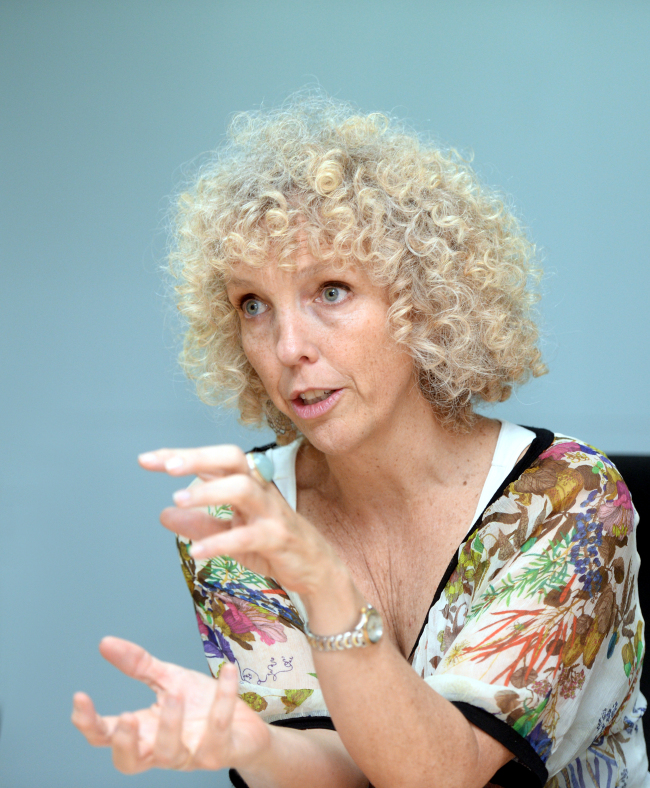South Korea should aim to generate 100 percent of its energy from renewable sources, phasing out nuclear and coal power plants simultaneously, Greenpeace executive director Jennifer Morgan said.
Praising the local government’s decision to retire old nuclear reactors and stop building new ones, the top environmental activist also stressed the importance of a national effort to save energy and the need to craft polices in a clear and transparent manner to benefit all, not a select few with vested interests.
 |
Jennifer Morgan, executive director of Greenpeace, talks during an interview with The Korea Herald in Seoul, Wednesday. (Park Hyun-koo/The Korea Herald) |
“Korea is shifting away from dirty fossil fuel to make change. It will be a real opportunity,” Morgan said in an interview in Seoul on Wednesday.
“Making transition to renewable energy is a good start but it can go even further. The key is to get the right policy to make sure that benefits go to the people.”
Going 100 percent renewable is what Greenpeace asks for from all countries, governments and companies around the world, Morgan said.
Nuclear energy and climate change are the two biggest threats to humanity, requiring efforts on all levels and fronts, she went on.
“Climate change should not be something political. It should be about us, our kids, nieces and nephews.”
The top environmental activist was in South Korea on a five-day visit, meeting policymakers and administers interested in environmental issues.
Among them were Gangwon Province Gov. Choi Moon-soon, South Chungcheong Gov. Ahn Hee-jung and Seoul Mayor Park Won-soon.
“I think it is important that those governors are linked in with others who try to move forward. They are key players, not only nationally but also globally as well,” she said.
On Wednesday, Morgan gave a lecture at Ewha Womans University on Wednesday, saying the massive impeachment protests last winter were “inspiring” for activists around the world to see.
“By looking at photos and news showing people power, I noticed the evolution of democracy, which is a type of people power that Greenpeace relates to,” Morgan said.
“You would not know how connected you are to other groups around the world.”
Founded by Canadian and US environmental activists in 1971, Greenpeace has over 3 million supporters worldwide.
It has presence in 55 countries, operating 26 regional offices. In Asia, it has four offices in Hong Kong, Beijing, Taipei and Seoul.
Although Seoul office is relatively young, established in 2011, there is “so much occurring” here, Morgan said.
Since South Korea is home to high-tech and IT companies, it should challenge the industry by showing the way to recycle gadgets, like smartphones, Morgan said.
Globally, the IT industry is making a green revolution, she added.
“Committed to 100 percent renewable energy values, IT companies like Apple, Google, Facebook have moved to solve their IT waste issues and they support related laws to get passed,” Morgan said.
On the US’ recent pullout from the Paris Agreement, the Greenpeace chief said it was wrong.
“He (US President Donald Trump) was so inaccurate,” she said, “Trump is holding back other Americans who want to move forward.”
By Kim Da-sol (
ddd@heraldcorp.com)





![[Exclusive] Hyundai Mobis eyes closer ties with BYD](http://res.heraldm.com/phpwas/restmb_idxmake.php?idx=644&simg=/content/image/2024/11/25/20241125050044_0.jpg)
![[Herald Review] 'Gangnam B-Side' combines social realism with masterful suspense, performance](http://res.heraldm.com/phpwas/restmb_idxmake.php?idx=644&simg=/content/image/2024/11/25/20241125050072_0.jpg)

